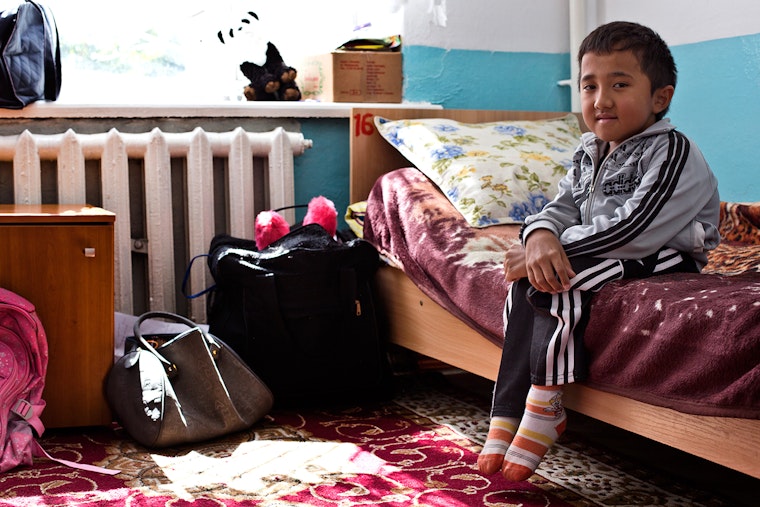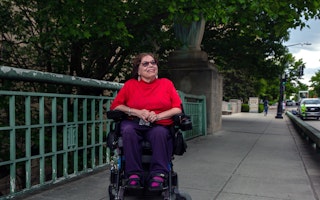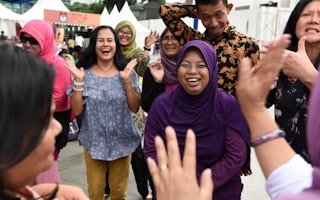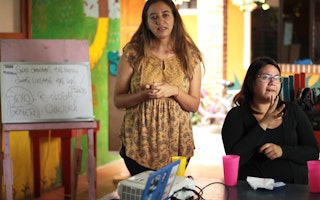Bringing School to an Orphanage in Kyrgyzstan Means New Prospects for Children
By Azat Israliov

Many kids born in post-Soviet countries with severe physical disorders move from hospital care to orphanages, never to organized schools.
In September 2013, the foundation Kelechek HealthProm, with the support of the Soros Foundation–Kyrgyzstan’s Education Program, opened two classrooms in a psycho-neurological institution. Askar, an 11-year-old boy, recalls: “When I came to class, I was fascinated by my teacher, books, a desk, and all things you need to study. It was very difficult to learn to write in the beginning, but then it got better.”
For this boy and others, a classroom once seemed impossible. Askar is a so-called “crystal” child suffering from osteogenesis imperfecta. In the early days of his life, Askar was left by his biological parents. When preparing documents in the hospital, workers often give optimistic names like Bogdan (“given by God”) or Azamat (“good boy”). Askar was named in 2002 after the Kyrgyz president Askar Akayev.
But unlike that namesake, Askar did not see anyone ushering him into schools. He lived in state institutions all his life, ending up in the Belovodsk Child Neuropsychiatric Social Residential Institution (BCI) at age seven. Here he lives and, finally, studies.
BCI now has the first-ever school at a psycho-neurological institution accountable to the Ministry of Social Development. This pilot group of 13 children convinced the members of Kelechek HealthProm that every psycho-neurological institution (there are three of them under the Ministry) must offer an educational program. The other two neuropsychiatric institutions have declared their readiness to establish schools.
Askar’s main friends are Lida, a girl suffering from the same disorder, and Sadyr and Andrei, boys. They spend most of the time together discussing movies, computer games, and a dining room menu.
Last year, they got to venture beyond this setting and visit an ordinary school. The project, funded by Soros Foundation–Kyrgyzstan, contracted a driver to take children from the orphanage to school #3, which provides barrier-free access.
Askar and his friends entered the school building on their wheelchairs. He was a little confused and shocked: “There are so many children and classrooms,” he said. A lesson passed by very quickly. “It’s a pity our orphanage does not have vehicles. I wish my friends and I could sometimes go to school. I want other children and teachers to see that we also know how to read and solve problems,” he said.
This confidence, say supporters, reflects the in-facility classroom’s effect. “We used to teach children by fits and starts, occasionally showing letters and counting,” says a teacher.
During the 10 months of the project, students have achieved a lot. They learned how to write, read, and count, and changed attitudes. Teachers say they became more self-critical, developed a stronger will, improved motor dexterity, and increased self-esteem.
All the children demonstrate a strong interest in learning. They learned to memorize material with repetition, visualization, and associations. All children now use words more accurately and have developed stable relations with classmates.
These relationship skills are hard for delayed children to find in Kyrgyzstan. “Children with musculoskeletal disorders look for any opportunity to communicate with people and the outside world as they grow,” opined Lyubov Nikolayevna Protasenko, deputy director of the Education Program.
Askar has also learned to seek connections beyond the facility. He spends hours using the social network Odnoklassniki. He writes literate and emotional letters to his teachers and people he knows.
Kelechek HealthProm is a grantee of the Soros Foundation–Kyrgyzstan. This post was translated from Russian.
Azat Israliov is a project manager for Kelechek HealthProm.


